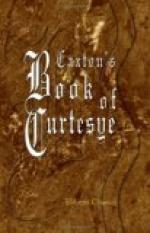Could it be ‘profitless,’ from A.-Sax. brec, gain, profit; or ‘breechless,’ a feast of birch for the boy with his breeches off? The latter was evidently meant, but it was a forced construction. The Oriel byrcheley set matters right at once.
Another passage I cannot feel sure is set at rest by the Oriel text. Hill’s and Caxton’s texts, when describing the ill-mannered servant whose ways are to be avoided, say of him, as to his hair, that he is
Absolon with disheveled heres
smale,
lyke to a prysoner
of saynt Malowes,[1]
a sonny busshe
able to the galowes.—Hill, l.
462.
[Footnote 1: An allusion to the strong castle built at St Malo’s by Anne, Duchess of Bretayne.—Dyce.]
For the last line the Oriel MS. reads,
a sonny bush myght cause hym to goo louse,
and Mr Skeat says,—“This is clearly the right reading, of which galowes is an unmeaning corruption. The poet is speaking of the dirty state of a bad and ill-behaved servant. He is as dirty as a man come out of St Malo’s prison; a sunny bush would cause him to go and free himself from minute attendants. A ‘sunny bush’ probably means no more than a warm nook, inviting one to rest, or to such quiet pursuits as the one indicated. That this is really the reading is shown by the next stanza, wherein the poet apologizes for having spoken too bluntly; he ought to have spoken of such a chase by saying that he goes a-hawking or a-hunting. Such was the right euphemism required by ‘norture.’”
If this is the meaning, we may compare with it the old poet’s reproof to the proud man:
Man, of [th]i schuldres and of [th]i side [th]ou mi3*te hunti luse and flee: of such a park i ne hold no pride; [th]e dere nis nau3*te [th]at [th]ou mighte sle.
Early English Poems, ed. F.J.F., 1862, p. 1, l. 5.
and remember that one of the blessings of the early Paradisaical Land of Cokaygne is:
Nis [th]er flei, fle, no lowse,
In clo[th], in toune, bed,
no house.
Ib., p. 157, l. 37-8.
We may also compare the following extract about Homer’s death from “Pleasant and Delightfull Dialogues in Spanish and English: Profitable to the Learner, and not vnpleasant to any other Reader. By John Minsheu, Professor of Languages in London. 1623,” p. 47.
“F ... a foole with his foolishnesse framed in his owne imagination may giue to a hundred wise men matter to picke out.
“I, So it hapned to the Poet Homer, that as he was with age blinde, and went walking by the sea shoare, & heard certaine Fishermen talking, that at that time were a lowsing themselues, and as he asked them, what fish they caught, they vnderstanding that he had meant their lice, they answered, Those that we [1]haue, we seeke for, and those that we [2]haue not wee finde, but as the good Homer could not see what they did, and for this cause could not vnderstand the riddle, it did so grieue his vnderstanding to obtaine the secret of this matter, which was a sufficient griefe to cause his death.”




